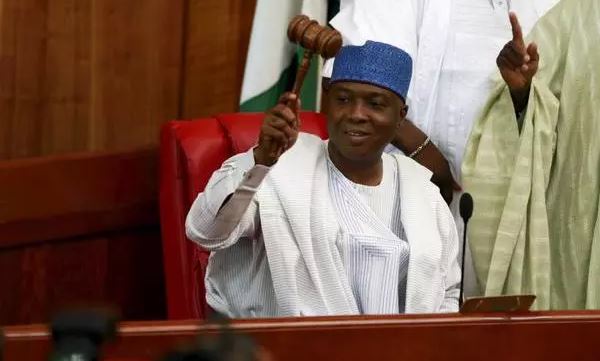CCT trial: Why Saraki has a case to answer - FG
Date: 2017-06-09

...as tribunal reserves ruling on defendant's bid to stop trial
The Code of Conduct Tribunal, CCT, sitting in Abuja, on Thursday, reserved its ruling on contention by the Senate President, Dr. Bukola Saraki, that the Federal Government has failed to prove its allegation that he falsely declared his assets. Saraki The two-man CCT panel led by Justice Danladi Umar, adjourned for ruling on a day FG insisted that Saraki has a serious criminal case to answer.
FG, through its lawyer Mr. Rotimi Jacobs, SAN, urged the tribunal to compel the defendant to enter his defence to the 16-count amended charge pending against him. Saraki had shortly after FG closed its case on May 5, informed the tribunal of his decision to make a no-case-submission.
In the application he eventually filed on May 26, the embattled Senate President, argued that none of the four witnesses that testified before the tribunal was able to link him to the commission of any offence. Saraki, through his team of lawyers led by Chief Kanu Agabi, SAN, maintained that the prosecution failed to by way of both documentary and oral evidence, established ingredients of any of the indictments contained in the charge to warrant the tribunal to compel him enter his defence. Contending that FG failed to establish a prima-facie case against the defendant, Agabi, SAN, added that his client had nothing to do with petitions that allegedly led to the charges.
Besides, Saraki's lawyer argued that counts 1, 2, 6, 9,10, 11, 12, 13, 14 and 16 of the charge was bereft of valid offences. "Our submission is that the prosecution has not made out a case warranting an answer from the defendant.
"We were told by the prosecution that the charges were precipitated by petitions tendered as exhibits 10, 11, 12, and 13. "My lord should read the petitions. We beg your lordship to read them, they have nothing to do with the defendant.
"Let us assume the petitions were investigated, where is the report? Who are the writers? Why are they not here? "The second point is that in counts 1, 2, 6, 9,10, 11, 12, 13, 14 and 16, the defendant was charged with 'making false declaration by making no declaration'. "My lord there are so many inconsistencies in the charges", Agabi submitted.
Saraki's lawyer insisted that some the witnesses gave hearsay evidence which he said could not be relied upon by the tribunal. He specifically faulted the evidence of the star prosecution witness, Mr. Michael Wetkas, who is an operative of the Economic and Financial Crimes Commission, EFCC, that led a team that investigated allegations against him. Saraki also described as "unreliable", the evidence of the second prosecution witness, Mr. Samuel Madojemu, who is an official of the Code of Conduct Bureau, CCB and a member of the joint investigative team FG constituted in 2015 to probe his assets.
However, the prosecution counsel, Mr. Jacobs, SAN, urged the tribunal to dismiss the no-case-submission and order Saraki to defend allegations that FG levelled against him in the charge. Jacobs argued that FG had successfully made out a serious prima-facie case against the defendant to warrant him to give explanations before the tribunal.
He urged the tribunal to analyse and juxtapose various assets declaration forms that Saraki submitted to the CCB between 2003 and 2011, with a view a view to ascertaining whether or not he made false declarations.
"One method your lordship should adopt to show that there is serious prima facie case against the defendant is to look at Exhibits 6 and 26 which are assets declarations made by the defendant after the investigation of this case.
"My Lordships will see that the defendant listed all the annexed properties and stated that they were acquired in 92 and 99 and, now. If my lord juxtaposes them with Exhibits 1 to 5, some of the properties he claimed to have acquired in 1999, 2002, and 2003, were not declared."
Jacobs also argued that Saraki "misconstrued" Paragraph 1 to the Schedule 5 of the 1999 Constitution, as amended, by claiming that a public officer was not under obligation to declare properties bought in companies' names.
"To construe the constitution like that will defeat the essence of the CCT and the fight against corrupt in Nigeria," the prosecution argued. Jacobs further dismissed Saraki's contention that he was not linked in any of the six petitions that precipitated his trial.
"My lord even without a petition, someone can still be prosecuted", Jacobs submitted. He also faulted the defence team for filing 120-paged address in support of the no-case-submission. According to the government lawyer, action of the defence was an invitation for the tribunal to deliver a lengthy ruling at this stage of the proceeding, contrary to a directive from the Supreme Court.
"Care must be taken about what my lord can do at this stage. They were inviting your lordship to give an opinion on the witnesses and evaluate their evidence.
"The Supreme Court has said your lordship cannot do that at this stage. "At the stage, your lordship cannot express opinion on the evidence led until the defence give their own evidence. "The Supreme Court warned that the ruling on a no-case submission must be kept brief. "It is permitted to just say there is case to answer.
FG had in the charge with suit No. CCT/ABJ/01/15 alleged that Saraki made false/anticipatory declaration of assets before the Code of Conduct Bureau operated foreign accounts while in office as Kwara State governor between 2003 and 2011, as well as collected governorship salary four years after his tenure had elapsed.
Source



